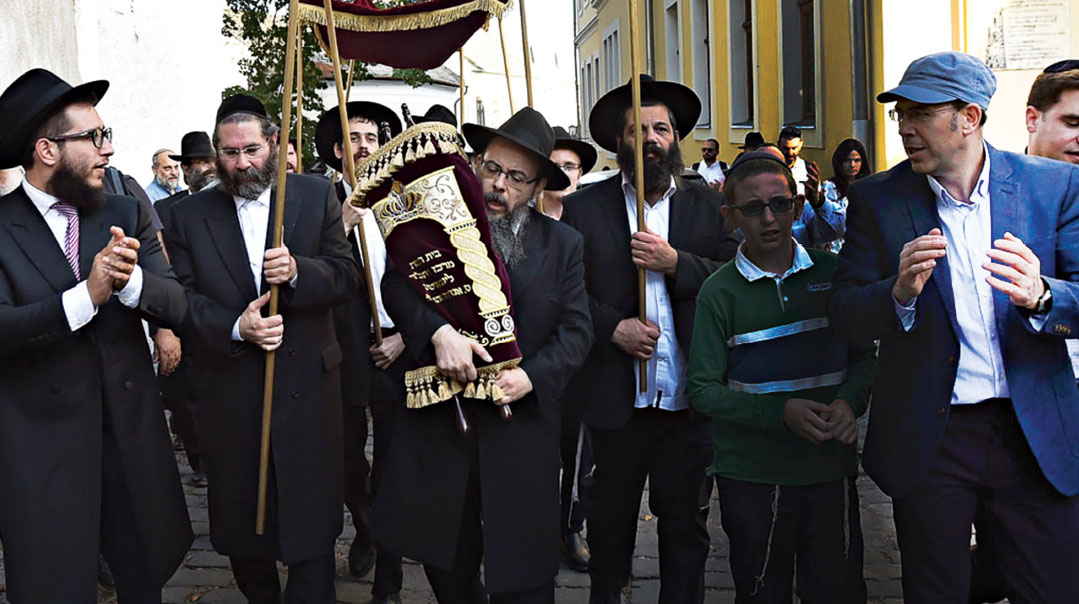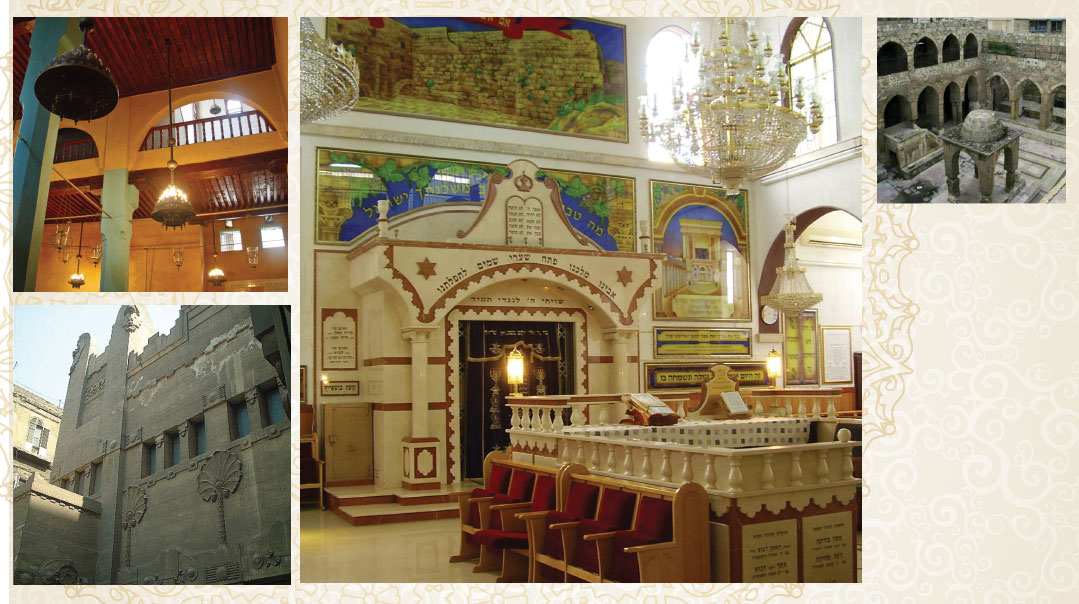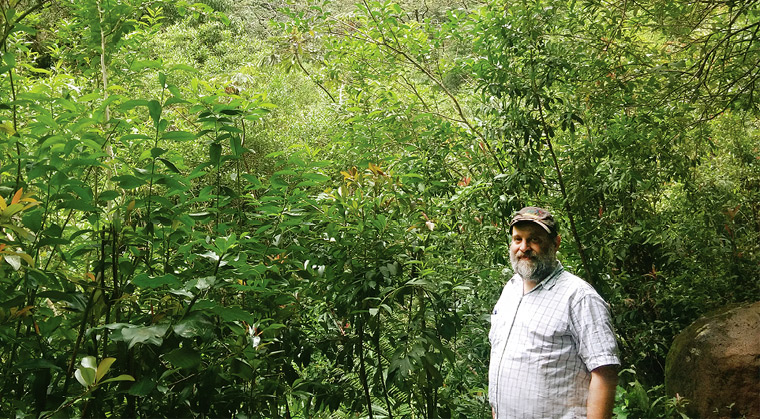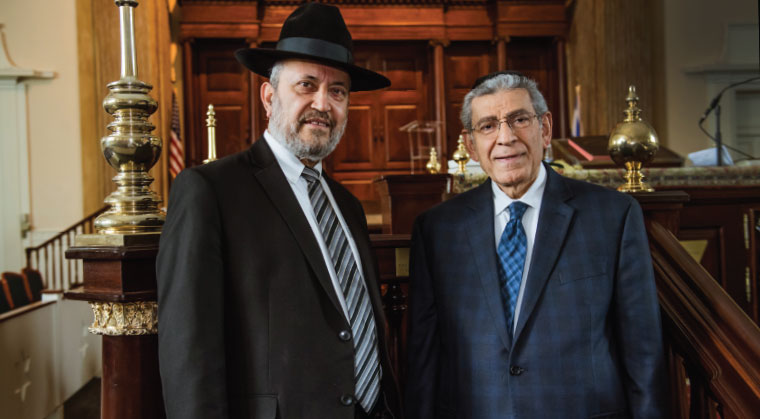Scranton Guys for Life

As I sit with a group of men representing four decades of the yeshivah, they all have one thing in common: Scranton guy. How did the yeshivah create that glue?
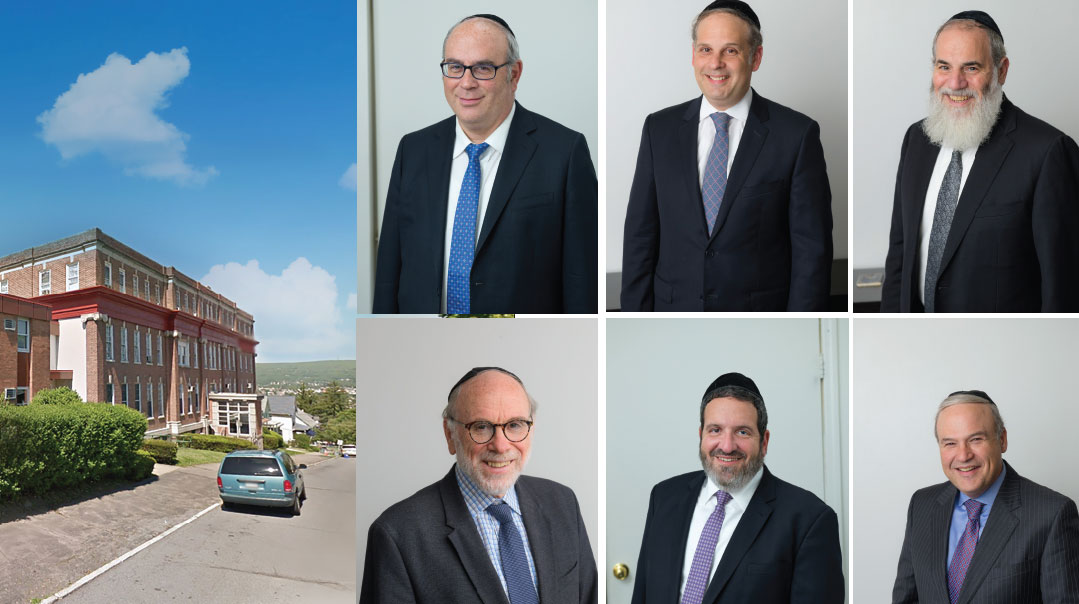
Not many people know what “Yeshiva Bais Moshe” is, but known by its shorthand name — “Scranton” — it’s been a fixture of the American yeshivah world for well over a half-century now.
Located in the city of Scranton, nestled in Pennsylvania’s Pocono Mountains, the yeshivah was founded by two talmidim of Rav Aharon Kotler in Lakewood, Rav Yaakov Schnaidman and Rav Chaim Bressler shlita, who continue at its helm to this day. More recently, they’ve been joined in the hanhalah by the next generation, Rav Chaim Schnaidman and Rav Chaim Bressler’s son-in-law, Rav Nachman Pritzker.
Along with such mainstays as Philadelphia, Long Beach, and Denver, Scranton is a member in good standing of that elite group, the “Lakewood yeshivos,” all founded by those who learned under Rav Aharon in the Lakewood glory days of the 1950s. Yet I’ve always thought of Scranton as “Lakewood with a difference,” sensing that there’s a certain something that has enabled Scranton to produce three generations' worth of down-to-earth, erliche talmidim who are learned in Torah, exemplary in menschlichkeit, and possessed of a clear-eyed hashkafas hachayim.
Recently, I sat down with an intergenerational group of “Scranton guys,” hoping to learn more about that certain special something. Put six former yeshivah guys in a room, and in the blink of an eye, 50- and 60-something men with families and businesses and very busy lives transform before one’s eyes into guys who’ve time-traveled back 40 years, sitting in their dorm rooms (or the back of the beis medrash), holding forth on everything from the unique rebbi-talmid bond they all share to being a Brooklyn kid plunked down into a Pennsylvania coal-mining town to something called… “the Cheerios shmuess.”
The ’60s:
Shmiel Rand, who was in Scranton’s first high school class in 1965 and continued on through 1971, lives in Boro Park and works in the jewelry industry.
The ’70s:
Rabbi Eliyahu Hoberman spent the years 1972 to 1984 in Scranton, progressing from ninth grade through kollel. A Flatbush resident, he is associate director of development at Yeshiva Rabbi Chaim Berlin and chairman of the Alumni Association of Yeshiva Bais Moshe.
Meyer Weill lives in Flatbush and owns a medical supply company. He learned in the yeshivah from 1976 to 1981 but says, “I never left Scranton and Scranton never left me!”
The ’80s:
Benjie Epstein is an attorney living in Flatbush who learned in Scranton from 1979 to 1983 and “in essence, never left, due to the incredible hakaras hatov that I have toward it.”
Gavriel Schwab, a commercial insurance broker residing in Flatbush, was “physically in Scranton from 1980 to 1983, but is still a talmid of Yeshiva Bais Moshe to this day,” and considers it the “benchmark for how I view all yeshivos.”
The ’90s:
Elchanan Hamada, a Flatbush resident who’s in the import business, learned in Scranton’s beis medrash and kollel from 1987 to 1996. He is currently the chairman of the executive committee of the yeshivah.
A Different Time and Place
Shmiel Rand, the room’s elder statesman, opens with a memory of Scranton’s very first day, in the summer of ‘65:
On a rainy Tuesday in mid-August, my father put me on a Martz Line bus from Boro Park to downtown Scranton, a very naive 15-year-old kid traveling alone to a new yeshivah no one I knew had ever heard of. I was met at the bus station by a nice, clean-shaven young fellow who, I figured, was a beis medrash bochur. We walked across the street, and I got into a car next to my escort. In the front passenger seat sat another young-looking fellow with a reddish beard. The driver was a tall man with a white beard, a soft-spoken, distinguished-looking man. Naturally I assumed that was the rosh yeshivah.
But as we made the turn onto Monroe Avenue, the street of the yeshivah, my seatmate turned to me and introduced the driver as “one of our balabatim, Mr. Fink.” All of a sudden it dawned on me — it was these two others who were the roshei yeshivah! That was my introduction to Rav Yaakov Schnaidman (he had the beard) and Rav Chaim Bressler. They were 27 and 28, respectively, and the handful of beis medrash bochurim who came that first year were only ten years their junior.
There was one high school class, a ninth grade of 12 kids, with Reb Chaim as our rebbi — and he played baseball with us too. The English teachers knew this was a serious, “prep” type of school, where we were expected to come to class with a shirt and tie, there was an honor roll that got published in the local paper, and the guys wore caps and gowns at graduation.
We were a very diverse group, a mix of New Yorkers from Boro Park, Flatbush, Monsey, and the Bronx, with a few from places like Wilkes-Barre and Pittsburgh. Out of town, people don’t necessarily wear white shirts even on Shabbos, and one Friday night, as a gag, a bunch of guys came into shul all wearing blue shirts. Afterward I remember Reb Chaim walking around saying, “Boy, this Shabbos came out of the blue....”
Rabbi Eliyahu Hoberman: That’s Reb Chaim, such a great sense of humor and always very punny. One time, guys went over to the most gullible kid in the class and told him Reb Chaim was looking for him, so he goes to Reb Chaim and says, “Rebbi was looking for me?”
Reb Chaim chopped immediately and sends the guy back to the beis medrash to ask the guy who’d sent him to come to Reb Chaim’s office. Two minutes later, the second fellow comes in.
“Rebbi asked for me?”
“Me? Nah. But can I help you with something?”
Always very sharp, very funny — even in the shmuess before Ne’ilah, he was capable of throwing out a pun, like something about a guy at the edge of a cliff, who went too far and turned out to be dead wrong….
Meyer Weill: Reb Chaim once said in a speech that when he and Reb Yaakov came from Lakewood looking to open a yeshivah, they scouted out Scranton and nearby Wilkes-Barre.
“The two towns had a fight over where the yeshivah would open,” Reb Chaim said, “and Wilkes-Barre won….”
Shmiel Rand: You remember those readers we had in kindergarten with Dick and Jane and the cop on the beat on Main Street? Well, that’s what Scranton was — Anytown, USA, a slice of rural American heartland. At 12 o’clock every night, like clockwork, we’d hear the railroad train coming through town.
And Jewishly, too, it was a different time. I remember walking with Shlomo Freundlich, who was from Wilkes-Barre, on Shabbos afternoon, and coming toward us was this elderly Jewish lady, dressed properly, with a hat and white gloves and pocketbook.
She says to us, “Good Shabbos, gentlemen.”
After she passed by, I turned, incredulous, to my friend. “That lady’s carrying a pocketbook and she said ‘good Shabbos’ to us!”
And he says to me, “So?” He was used to this, because that’s how it was out there.
Scranton’s Secret Sauce
I’m sitting with a group of guys representing four decades of the yeshivah, but you’d never know it, as they all seem to coalesce around one unified identity: Scranton guy. How does a yeshivah succeed in creating camaraderie that thick?
Gavriel Schwab: For me, warmth, connection, love — that’s the story of Scranton, everything else is commentary. I was in ninth grade in Toras Emes Kaminetz in Boro Park, and my parents decided it was best for me to go out of town. I went first for a farher in a major New York–area yeshivah, a choshuve place with choshuve guys, but it was a cold experience. Two weeks later, I went to Scranton for a Shabbos, and from the moment I walked in and someone came over to give me shalom aleichem, I felt the warmth instantly. I felt at home from the first moment, even though I was just coming for a farher! That feeling has lasted ad hayom hazeh, and that’s the feeling every Scranton guy has.
The warmth emanated from the roshei yeshivah, but it’s also the guys. You know, once a Scranton guy, always a Scranton guy, one for all and all for one. I must also mention the mashgiach, Rav Avrohom Turin, who also showed great warmth despite his ability to be tough at times, giving mussar and handing out those kenasim [fines for misbehavior], which I got from time to time — although I must tell you, I used to write him checks for those kenasim, and none were ever cashed. From the rebbis — Rav Hillel Sittner, Rav Berel Epstein, Rav Avraham Karp, Rav Yaakov Fensterheim, and Rav Shia Penstein — to, of course, the roshei yeshivah, the entire building was permeated with a warmth and love for every bochur.
Benjie Epstein: You mentioned Rav Turin, I have to tell you that when I came to yeshivah after high school at age 17, I was an only child whose father had passed away, and my mother had zero money. I had been a camper for years in Camp Agudah Toronto, where Rav Turin was the manhig ruchani, so he knew me. My mother told me that even though we didn’t have a penny, the mashgiach was the one who said, “We have to take him, we’ll work it out.”
Elchanan Hamada: Speaking of the warmth, I’ll tell you that I came to yeshivah because of Eli Hoberman’s chasunah. I was in 12th grade in a New York yeshivah and unsure where to continue the next year. A relative of mine told me she’d just been at a Scranton chasunah, and the boys danced so nicely, with such achdus, why not check it out. The next day in yeshivah, when I asked a guy for change of a dollar, I noticed he had this blue change pouch that Scranton had sent out in a fundraising campaign.
I said, “Can you turn that thing over? I need to copy that phone number.”
I went home and asked my mother to make the call. She was nervous, and when Reb Chaim picked up, she said, “I’d like to register my daughter in your school.”
To which he replied, without missing a beat, “I’m sorry, but right now we only have one class, and we don’t have any girls’ classes….”
There was such a warmth and a good-natured tone, even on the phone.
Benjie Epstein: I got married five days before Eli Hoberman, so I was in the middle of sheva brachos then, and I asked Reb Yaakov what to do. He said, “So you’ll make sheva brachos at his chasunah,” and I did, out in the hall. Who does something like that? We do, because Scranton’s secret is twofold: the unbreakable bond between the talmidim and the roshei yeshivah and between the talmidim themselves.
You can be a 28-year-old rosh yeshivah and there can be a shtoltzkeit too. It’s not about the age. There’s something about Scranton — from ’65 until today, there was never a shtoltz. And that filtered down throughout the yeshivah, to the point that my kids tell me, “Ta, wherever we go in the world, there’s always Scranton guys — did everyone learn there? — and you’re all so friendly.” People are in awe of the friendships, which started 30, 40, 50 years ago, and haven’t waned.
Meyer Weill: A few of us here are on the yeshivah’s tuition committee, and I can tell you the roshei yeshivah have always said that even if we sense that parents aren’t being totally above-board with us about finances, that’s not a reason for their son to suffer. We have to accept him anyway.
Rabbi Eliyahu Hoberman: There was an incident a few years ago in which a boy came to the yeshivah for a farher and one of the bochurim didn’t make place in his dorm room for him to sleep, sending him to go sleep elsewhere. So offensive was it to the entire DNA of the yeshivah to not welcome this boy into the yeshivah properly, that the offending bochur was sent home and the roshei yeshivah seriously considered not allowing him back. This warm embrace is something that radiates forth from the roshei yeshivah and as result, if you’re not that kind of boy, you’re not even going to think of coming to Scranton.
Shmiel Rand: Yisroel Pfeffer graduated high school in 1970, and the fact that he still comes back to the yeshivah for Yom Kippur really says something, and he’s not the only one.
Meyer Weill: We all go back. Last year was my 43rd year davening Rosh Hashanah and Yom Kippur in Scranton. The number of alumni who come back for Yamim Noraim — with wives and children, including married ones — is unusually high, as yeshivos go.
Elchanan Hamada: I was the gabbai during my yeshivah days, and I was asked to continue in that position when I go back for the Yamim Noraim. The roshei yeshivah want to honor the returning alumni with various kibbudim, and that would be too daunting of a task for the regular gabbai to fulfill.
One year, my daughter was born just days before Rosh Hashanah, so I stayed home. But with my wife’s blessing, I went for Yom Kippur, and when I walked in on Erev Yom Kippur, the roshei yeshivah were shocked. The rosh yeshivah Reb Yaakov receives shlishi on Yom Kippur, and after his aliyah, he asked for my machzor. I handed it to him, and the beis medrash fell silent as he made a Mi Shebeirach for my wife in appreciation of her letting me join the yeshivah for Yom Kippur. I still get chills thinking of the scene.
Rabbi Eliyahu Hoberman: The brotherhood holds fast in good times and bad. Last year, there were three alumni with life-threatening illnesses, one of whom unfortunately didn’t make it, and there were four alumni who didn’t have the financial wherewithal to make weddings. We raised enough from the alumni to be able to give them all serious checks to help out. Then there’s Reb Reuven Bauman z”l, the rebbi in Norfolk, Virginia, who was tragically niftar this summer. He and his brothers learned in Scranton, and the alumni have raised over half a million dollars for his family.
Roshei Yeshivah, and So Much More
Rabbi Eliyahu Hoberman: It was rare for the rosh yeshivah Reb Yaakov to give a shiur in which he didn’t say, “and the rosh yeshivah Reb Aharon said like this-and-this…” Both roshei yeshivah learned by Reb Aharon and continued on in Lakewood for three years after Reb Shneur became rosh yeshivah.
I drove Reb Yaakov to Reb Shneur’s levayah in Lakewood. At 3 a.m., we came to the home of Reb Moshe Gelbwachs, who was in Scranton’s first class. He was in the chevra kaddisha, and at 5 a.m., he and the rosh yeshivah got up and left to do the taharah.
Elchanan Hamada: Rav Yeruchem Olshin once was in Scranton for a siyum, and when he stopped by the yeshivah, he told us that Reb Aharon ate with bochurim on Shabbos, and one had to be invited to eat at his table. That honor was reserved for the very best bochurim in the yeshivah in Lakewood, but Yaakov Schnaidman was at that table, despite being much younger than everyone else there.
Reb Yaakov spent nine years learning by Reb Aharon, but he said he didn’t necessarily feel everything had to be like it was in Lakewood. There, for example, there were no shmuessen by Shalosh Seudos, but in Scranton, that’s when he and Reb Chaim would alternate weeks saying a shmuess.
Their styles are very different. Reb Yaakov says deep machshavah geared for the older bochurim, but even the younger ones benefit by seeing how deep Torah is, even if they don’t grasp everything. Reb Chaim spoke on a more practical level and would sprinkle his shmuessen with memorable lines. For example, the parshas Toldos shmuess is known for posterity as the “Cheerios shmuess,” because Reb Chaim would ask: “The Torah says Eisav was called Edom because he asked Yaakov for the soup that was adom, red. Does that mean if he had instead asked for some breakfast cereal, he would’ve been called Cheerios for eternity?”
That’s why if you tell me the parshah, I can tell you the whole shmuess he said for that parshah, and this is 25 years later. In fact, when you meet another Scranton guy, all you need to do is mention one line from the shmuess, and both of you instantly know the whole thing.
Rabbi Eliyahu Hoberman: I don’t know if you guys remember, but there’s this one window in the library from which one can see down into the rosh yeshivah’s office. It’s a tiny office, and he’d have this little, powerful lamp shining onto him as he sat preparing his pre–Rosh Hashanah maamar. I remember some of us peeking in, watching what was an unforgettable, otherworldly scene of the rosh yeshivah, sweating away, engrossed in the highest machshavos as if in a different world.
Shmiel Rand: During the yeshivah’s early days, there was a famous actor who had a dispute with the phone company, and to get back at it, he publicized his phone calling card number and invited anyone to use it to make unlimited calls. Guys in various yeshivos found out about this and here too they were making calls to everywhere, even Eretz Yisrael, from every phone in the yeshivah and pay phones on the street. Well, the next morning, a phone company representative showed up to speak with the roshei yeshivah because they had traced the calls. The rosh yeshivah walked into the beis medrash in the middle of first seder and stopped everything to say a shmuess in which he quoted the famous Ramban in parshas Kedoshim about being a naval b’rishus haTorah.
I must add that the rosh yeshivah Reb Yaakov used to say a Nefesh Hachayim shiur on Friday night, and to this day, every time I begin Shemoneh Esreh and say the word “Baruch,” it takes right me back to that shiur. That says it all.
Elchanan Hamada: One Thursday night in 1991, the rosh yeshivah suddenly appeared in the yeshivah during supper, which was very uncharacteristic, and everyone was told to go up to the beis medrash to say Tehillim. We had no radios, so we were cut off from the world, but the first SCUDs had just been launched at Israel. That scene of seeing the rosh yeshivah say Tehillim with such bechiyos has stayed with me more than the memories of any Elul.
Rabbi Eliyahu Hoberman: Speaking of tears, I remember distinctly watching the rosh yeshivah at the Seudah Shlishis, crying openly during the singing of Yedid Nefesh as we reached the words “Keil na refa na lah.” I asked him about it afterward, and he broke the news to me that Reb Shneur had just been diagnosed with a terminal illness.
Making It Personal
Benjie Epstein: This is something that has never left me and won’t so long as I live. We didn’t have children for many years. I gave Reb Yaakov my name and my wife’s name and never spoke with him about it again — until ten years later, when we had twins. I called him with the great news and said, “I just want to thank the rosh yeshivah. I don’t know if the rosh yeshivah remembers, but I once gave him our names…”
He stopped me cold: “What are you talking about? There hasn’t been a tefillah since you gave me your names in which I haven’t had you in mind.”
That’s ten years, Shacharis, Minchah, and Maariv, and he never said a word about it, until ten years later when I had twins, and even then, only because I brought it up.
Meyer Weill: When my wife and I were married 30 years, she had to undergo a medical procedure, and I called Reb Yaakov the night before to say, “I want to give the rosh yeshivah my wife’s name to have her in mind in davening tomorrow.”
He said to me, “What do you mean? Your wife’s name is such-and-such, I daven for you and your mishpachah every day…”
And I know of another story of a talmid whose child is waiting for the first child after several years of marriage. One day, Reb Yaakov called him: “Please give me the couple’s names again. I think I may have one of them wrong …”
Rabbi Eliyahu Hoberman: The relationship we have with him, it’s even more than a father in certain ways. The saying goes, “You can’t choose your relatives, only your friends.” But this was a father we chose, and he, in turn, chose us to be his children.
The yeshivah has two buildings adjacent to each other, and I was in a third-floor corner dorm room with a good view of the space between the buildings. It’s 6 a.m. on a winter morning in the early ’80s. I hear noise outside, so I look out — the rosh yeshivah, Rav Yaakov Schnaidman, is shoveling the path between buildings so that when the boys come for davening at 7:30, it will be clear of snow. I quickly threw on clothes and hurried down to take over the job, but he wouldn’t hear of it, telling me, “Go back to sleep. I’m almost done.”
Shmiel Rand: When the yeshivah started, the only way we had chalav Yisrael was that the roshei yeshivah themselves would travel to the farm at 4 a.m. to pick up large canisters of milk. Later, beis medrash bochurim took over the job.
Benjie Epstein: On a lighter note, I was once sick in my dorm room for a bunch of days, and after it passed and I came back down to the beis medrash, some jokers came over to me and said, “Benj, didja hear?! Reb Chaim’s daughter became a kallah to so-and-so,” naming a bochur in the yeshivah. (By the way, don’t get the wrong idea: They used to do this to me all the time, and I loved the attention!)
So I headed straight for Reb Chaim’s seat at the front of the beis medrash, with these guys looking on, barely able to contain themselves. I gave him Reb Chaim mazel tov and he says to me, “For what?” I told him, and he puts his arm around me and hugs me close, like a father to a son, and says, “Benj, you’ve been had.” He takes me into his office and tells me, “I don’t really need to know who the guy was, but tell him I want to see him.” I protested that I didn’t want anyone getting in trouble, but it was clear that he just wanted the guy to come in so Reb Chaim could pull the same shtick on him.
The way he just took the whole thing in good-natured stride, with an understanding of boys being boys, was just amazing. It comes back to that complete absence of shtoltz you might find elsewhere.
Shmiel Rand: Even when I was disciplined, it was done without shtoltzkeit, just as something that unfortunately had to be done because I had crossed the line.
Mutual Respect Brings Harmony
Shmiel Rand: When the yeshivah first came to Scranton, there was a senior rav in town named Rav Gutterman, a big talmid chacham who had been in YU’s first graduating class. The actual rav in my days was Rav Mordechai Shapiro, a phenomenal talmid chacham who had learned under Rav Isser Zalman Meltzer in Europe and Rav Aharon Kotler in Lakewood. There was a period in which, after going to a rebbi’s house on Friday night, we’d go to his home. It was amazing to see how one bochur would mention a pasuk and the Torah just flowed forth from him nonstop.
The yeshivah started out in 1965 in the Hill neighborhood in downtown Scranton, where the frum community is still located to this day. But in 1976, the yeshivah purchased the two buildings that had housed Mercy Heights Hospital, which is a 40-minute walk from the frum community.
Nevertheless, from the very beginning years under Rav Shapiro and continuing through all the years under the current rav, Rav Mordechai Dov Fine, the roshei yeshivah would walk at the head of the entire yeshivah to attend the rav’s Shabbos Shuvah derashah — even once the yeshivah was located 40 minutes away. It’s not something guys are required to do, but who can watch the roshei yeshivah make that walk and not come along?
Gavriel Schwab: The tremendous relationship between the rav of the community and the yeshivah is a great testimony to both sides. The love between Rabbi Fine and the roshei yeshivah is something to see, they’re like brothers-in-arms. And the balabatim in town became extremely beloved to the bochurim and vice versa, and that’s because Rav Shapiro and Rav Fine so encouraged that. How many balabatim are we still friendly with to this day because we ate at their homes and were invited to their simchahs.
Meyer Weill: And if you speak to other smaller communities, and then you compare their experience to that of Scranton, you’ll know those other towns don’t have that kind of relationship, to say the least.
Elchanan Hamada: It’s infrequent for there to be a Scranton chasunah at which Rabbi Fine isn’t present, and he gets a kibbud there too. That often means driving great distances, and this is despite the fact that he’s a tremendous masmid, someone who gets up at 4:30 a.m. to prepare shiurim. He’s a posek, and many of the alumni call him all the time with sh’eilos. In fact, through me, my entire family now has a relationship with him, my wife, my mother, everybody.
Hostile Reception
Meyer Weill: Scranton was historically a working-class, heavily German and Irish city with a lot of very low-class elements, what some would call “white trash.” As soon as the weather turned warm in the spring, it would become a nightly occurrence for shkotzim to ride by shouting epithets and throwing things like M-80s, to the point that we used to have bochurim staked out around the building waiting for these guys.
Benjie Epstein: My very first night in the yeshivah, I’m learning in the beis medrash with my chavrusa and an M-80 comes flying through the window. I thought to myself, “This is getting interesting.”
Meyer Weill: One time, there was a huge fight that brought most of the yeshivah out, we had to beat one dangerous guy to a pulp. When the cops showed up and they saw him in that condition, they asked the rosh yeshivah what had happened, and he replied: “He fell.” They understood.
Benjie Epstein: But I remember that after that one, when almost the whole yeshivah emptied out, the mashgiach called everyone back into the building and the rosh yeshivah gave a shmuess with the theme of “Elokim yevakeish es nirdaf,” that we have to remember that it is for Yidden to be nirdafim, not rodfim.
Responsibility for All
Benjie Epstein: There was a cook in yeshivah in our days, a traditional Jew, who then retired and moved to New York. Years later, after we were all long married already, he died, and the rosh yeshivah called us up and said, “We’ve got to take care of him.” That’s all we needed to hear. We all got together, went out to the cemetery, and buried him. There was no one else to do it, so we did. We even had to tell the officiating rabbi the niftar’s correct name.
Rabbi Eliyahu Hoberman: There was a nearby community called Oliphant, which had a shul, but it was a very weak religious community. The roshei yeshivah made a rotation of boys, sending two each week to spend Shabbos there, with one serving as baal tefillah and the other as baal korei. The cook would pack up Shabbos meals for us, and every week another two bochurim would take their turn.
Shmiel Rand: In my days, there was a rebbi in yeshivah named Rav Eliyahu Attias, a great talmid chacham. A minhag had started for the class to give the rebbi a gift when we went to his house for the Chanukah mesibah. The year we had Rav Attias, someone happened to see him and his wife doing their laundry at the local laundromat, and we were taken aback that they didn’t own a laundry machine. So we got together to raise the money, and Mr. Arnovitz, who owned an appliance store in town, agreed to give us a break on the machine.
I still remember the scene: It was in the middle of shiur one day, and his rebbetzin came to tell him that someone had delivered the machine. She was beside herself with excitement. The story spread first throughout the yeshivah and then throughout the town about how a bunch of 11th-graders had pitched in to buy their rebbi a washing machine.
Rabbi Eliyahu Hoberman: Speaking of gifts, in the mid-’90s, Reb Chaim’s housed burned down, so we raised $50,000 for him. I had an inkling that it wasn’t going to be easy to get him to accept it, so I recorded all the names and amounts. I drove up to Scranton to present him with a check for the entire amount.
He wouldn’t hear of it. “I didn’t ask you to do this.”
“But Rebbi, the talmidim across the country want to help out, and they’ve already given the money.”
“That’s your problem.”
In the end, with Reb Chaim’s agreement, we wrote a letter to the donors saying he would be getting some insurance proceeds and Hashem would help with the rest, and that people had the option of getting their money back or donating it to another cause. But he didn’t take the gift, nor did he ever.
Shmiel Rand: And this is the same Reb Chaim Bressler who, in 1972, gave his house to the Freundlichs, who fled their home in Wilkes-Barre ahead of a flood that engulfed the city.
You know, a boy can learn Torah in any yeshivah. But there’s a notion out there, and I think it’s correct, that if you want your kid to be a baal middos, send him to Scranton. And when you hear us talk about the roshei yeshivah, you know why.
Even the most pleasurable stroll down memory lane must eventually conclude, and this one is no different. One by one, by conversation’s end, the erstwhile yeshivah bochurim morph back into busy balabatim, this one with a meeting to go to and that one with a chavrusa waiting for him.
Our conversation needs a high note on which to end, and Reb Eliyahu Hoberman provides it: “During the shivah for Reb Reuven Bauman z”l, the members of the alumni association had a half-hour conference call with Rabbi Haber, the rav in Norfolk, to discuss the family’s needs. As it was ending, he got really emotional and said to us: ‘After speaking with you fellows, I have one regret — that I never learned in Scranton.’ ”
And after these last two hours in the company of these Scranton “lifers,” so do I.
(Originally featured in Mishpacha, Issue 781)
Oops! We could not locate your form.







